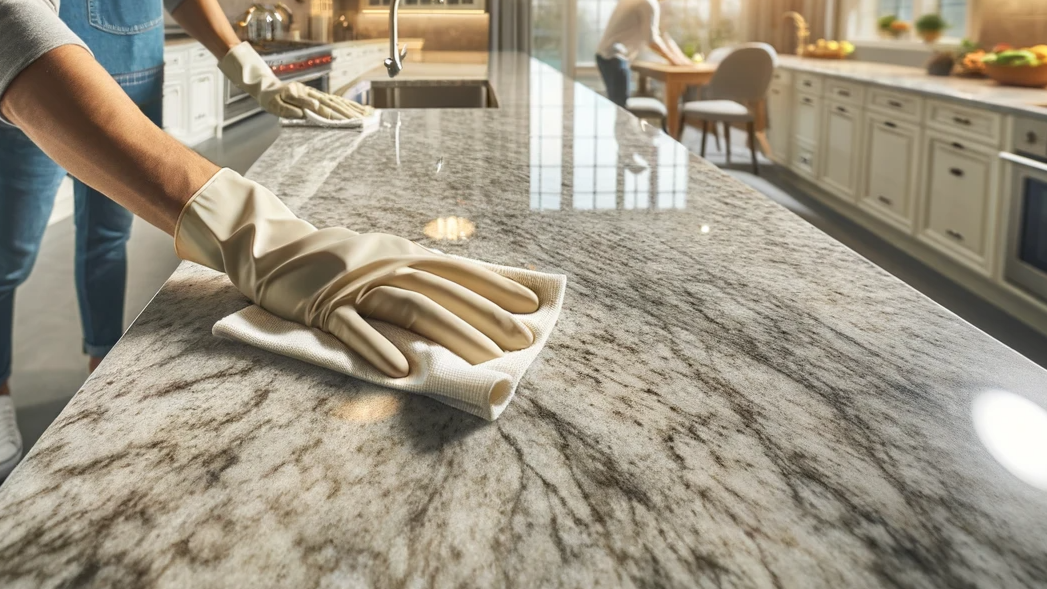What Should You Use to Clean Kitchen Counters – Clean kitchen counters using a mild dish soap and warm water solution. Kitchen counters should be regularly cleaned to maintain hygiene and prevent the buildup of food particles and bacteria.
In addition to dish soap, you can also use a mixture of vinegar and water or a commercial kitchen cleaner specifically designed for countertops. Prior to cleaning, remove any loose debris and wipe down the surface with a damp cloth.
Gently scrub the counters with the cleaning solution using a sponge or soft cloth, and then rinse thoroughly with clean water. Avoid using abrasive cleaners or scrubbing pads that can scratch the surface of your counters.
:strip_icc()/cleaning-tips-how-to-clean-your-home-with-vinegar-01-fbf462dbe68b4f62b8ad61e3fd63b72b.jpg)
Credit: www.bhg.com
Choosing The Right Cleaning Products
When it comes to cleaning kitchen counters, using the right products is essential to keep them clean and germ-free. With so many options available, it can be overwhelming to choose the right one. In this section, we will explore some factors to consider when choosing cleaning products for your kitchen countertops, including eco-friendly options and the difference between disinfectants and all-purpose cleaners.
Eco-friendly Options
Nowadays, many people are seeking eco-friendly alternatives for cleaning products. These options are not only better for the environment but also for your health. Eco-friendly cleaners don’t contain harsh chemicals that can be detrimental to your well-being, while still effectively removing dirt and bacteria from your kitchen counters. Look for products that are labeled as natural, biodegradable, or plant-based. You can even make your own cleaning solution using ingredients like vinegar, baking soda, and lemon juice.
Disinfectants Vs. All-purpose Cleaners
When it comes to choosing cleaning products for your kitchen counters, you may find yourself torn between disinfectants and all-purpose cleaners. Disinfectants are specifically designed to kill germs and bacteria, providing a deeper level of cleaning and sanitizing. They are particularly useful in areas where food is prepared and may come into contact with raw meat or other potentially harmful substances. On the other hand, all-purpose cleaners are versatile and can be used for various surfaces and purposes. They are great for everyday cleaning tasks and keeping your countertops looking fresh and tidy.
Before selecting a cleaning product, it’s important to consider your specific needs. If you have young children or family members with compromised immune systems, using a disinfectant may provide extra peace of mind. However, if you prefer a more multi-purpose approach or have no specific concerns about bacteria, an all-purpose cleaner may be suitable.
Remember, regardless of the cleaning product you choose, always follow the instructions and test it on a small, inconspicuous area of your countertop to ensure it doesn’t cause any damage. Regularly cleaning your kitchen counters with the right products will help maintain their cleanliness and extend their lifespan, ensuring a safe and inviting cooking environment for you and your family.

Credit: quicklyn.com
Effective Cleaning Techniques
For clean kitchen counters, use a mild dish soap and warm water, or a cleaning solution suitable for the surface. Avoid abrasive cleaners to prevent damage. Wipe with a soft cloth and dry to maintain cleanliness and shine. Regular maintenance prevents build-up and preserves the countertop’s appearance.
Proper Disinfection Methods
When it comes to cleaning your kitchen counters, proper disinfection is essential to maintain a clean and safe cooking environment. To effectively eliminate harmful bacteria and viruses, follow these simple steps: 1. Begin by removing any loose debris or crumbs from the surface using a dry cloth or sponge.
2. Prepare a solution of warm water and mild dish soap in a bucket or sink. 3. Dip a clean cloth or sponge into the soapy water solution and wring out any excess liquid. 4. In an up and down motion, wipe the entire surface of the counter, paying extra attention to areas that come into contact with food such as cutting boards or prep areas. 5. Rinse the cloth or sponge with clean water and wipe down the counter again to remove any soap residue.
6. To effectively disinfect the surface, use a disinfectant spray or wipes that are specifically designed for use on kitchen counters. 7. Spray the disinfectant directly onto the counter surface and allow it to sit for the recommended amount of time specified on the product label. 8. Using a clean cloth or sponge, wipe the counter surface again, ensuring all areas are thoroughly covered with the disinfectant.
9. For added protection, consider using a food-safe sanitizer that is approved for use on kitchen surfaces. Follow the manufacturer’s instructions for proper application. Remember, it is important to clean and disinfect your kitchen counters regularly, especially after preparing raw meats or handling items that may be contaminated with bacteria. By following these proper disinfection methods, you can help keep your kitchen counters clean and free from harmful germs.
Removing Stubborn Stains
Even with regular cleaning, kitchen counters can sometimes develop stubborn stains that are difficult to remove. Here are some effective techniques for tackling those tough stains: 1. For mild stains, create a paste by mixing baking soda with water until it forms a thick consistency.
2. Apply the baking soda paste directly to the stain and gently scrub the area using a soft brush or cloth. 3. Let the paste sit on the stain for a few minutes, then rinse with clean water and wipe dry. For more stubborn stains such as red wine or tomato sauce: 1. Make a mixture of equal parts hydrogen peroxide and baking soda. 2. Apply the mixture directly to the stain and let it sit for about 15 minutes.
3. Using a soft brush or cloth, scrub the area gently. 4. Rinse with clean water and wipe dry. When dealing with grease stains: 1. Sprinkle cornstarch or talcum powder on the stain and let it sit for a few minutes. 2. Gently scrub the stain using a soft brush or cloth. 3. Wipe away the residue with a clean, damp cloth. By using these effective techniques, you can successfully remove stubborn stains from your kitchen counters and keep them looking clean and fresh. Remember to always test any cleaning solution on a small, inconspicuous area first to ensure it does not cause any damage or discoloration.
Special Care For Different Countertop Materials
Granite And Natural Stone
Granite and natural stone countertops should be cleaned with a mild dish soap and warm water. Avoid using acidic or abrasive cleaners as they can dull the surface and cause damage.
- Regularly seal granite countertops to prevent staining and ensure longevity.
- Wipe up spills immediately to prevent staining, especially for materials like marble and limestone.
Laminate, Marble, And Quartz
For laminate, marble, and quartz countertops, use a gentle cleanser and warm water. Avoid harsh chemicals, such as bleach or ammonia, to prevent surface damage.
- Routine sealing is not required for quartz or laminate countertops.
- Marble countertops need periodic sealing to protect against stains and etching.

Credit: lakesidesurfaces.com
Maintaining Cleanliness In The Kitchen
To maintain cleanliness in the kitchen, it’s important to use an effective cleaning solution to clean kitchen counters. There are various options available, such as using a mixture of mild dish soap and warm water, or using specialized countertop cleaners that are suitable for your specific countertop material.
Regularly cleaning kitchen counters helps to prevent the buildup of grime and bacteria, ensuring a hygienic cooking environment.
Maintaining Cleanliness in the Kitchen When it comes to keeping your kitchen clean and hygienic, one of the most important areas to focus on is the kitchen counters. These surfaces come into contact with a variety of food items, utensils, and other items, making them prone to stains, bacteria, and other forms of buildup. But with the right cleaning routine and preventative measures, you can ensure that your kitchen counters remain clean and safe for food preparation. H3: Preventative Measures The first step in maintaining clean kitchen counters is to implement preventative measures.
By taking proactive steps to prevent stains and buildup, you can save yourself time and effort in the long run. Here are some preventative measures to consider: 1. Use cutting boards: Place cutting boards on your kitchen counters to protect them from direct contact with knives and other sharp utensils. This will help keep your counters scratch-free and prevent the transfer of bacteria. 2. Use trivets and coasters: Hot pots, pans, and cups can leave unsightly burn marks or stains on your kitchen counters. To prevent this, always use trivets or coasters to create a barrier between the hot items and your counters. 3. Clean spills immediately: Whether it’s spilled food, beverages, or oils, it’s important to clean up spills as soon as they happen. Wipe away the spills with a clean cloth or sponge to prevent them from seeping into your counters and causing stains or bacteria growth.
Daily Cleaning Routine In addition to preventative measures, implementing a daily cleaning routine is crucial to maintaining the cleanliness of your kitchen counters. By following these steps each day, you can keep your counters looking spotless and free from harmful bacteria: 1. Clear the clutter: Begin by removing any items, such as dishes or small appliances, from your kitchen counters. This will clear the way for a thorough cleaning and prevent any missed spots.
2. Wipe down with a mild cleaner: Using a mild cleaner or dish soap diluted with water, wipe down your kitchen counters with a clean cloth or sponge. Be sure to pay attention to any spills, stains, or areas prone to bacteria buildup. 3. Rinse and dry: After wiping down your counters, rinse off any residue with clean water and dry them completely with a towel. Moisture left on the counters can lead to mold or mildew growth, so it’s important to ensure they are completely dry. 4. Disinfect regularly: To kill any bacteria or germs that may be present on your kitchen counters, it’s important to use a suitable disinfectant regularly.
Choose a disinfectant specifically designed for kitchen surfaces, and follow the instructions on the label for effective use. By implementing these preventative measures and following a daily cleaning routine, you can ensure that your kitchen counters remain clean, hygienic, and safe for food preparation. Remember, a clean kitchen is not only visually appealing but also contributes to a healthier and more enjoyable cooking experience.
Tips For Tackling Common Kitchen Messes
Your kitchen counters endure a barrage of spills and stains on a daily basis. From grease and oil spills to stubborn food and beverage stains, keeping your countertops clean can be a challenge. However, with the right approach, you can easily tackle these common kitchen messes. Here are some tips to help you effectively clean your kitchen counters.
Grease And Oil Spills
Grease and oil spills are a common occurrence in the kitchen, especially if you love to fry or cook with oil. These spills not only leave behind unsightly stains but can also make your counters feel greasy. To tackle grease and oil spills:
- Immediately blot the spill with a paper towel or cloth to absorb as much oil as possible.
- Sprinkle baking soda or cornstarch on the affected area, let it sit for a few minutes, then wipe it away with a damp cloth. Both ingredients can help absorb the oils.
- For stubborn stains, make a paste using baking soda and water. Apply the paste to the stain, let it sit for a few minutes, then gently scrub with a soft brush or sponge. Rinse with water and dry.
Food And Beverage Stains
Food and beverage stains can be particularly stubborn and may vary depending on the type of spill. To tackle these stains:
- For coffee or tea stains, mix equal parts white vinegar and water. Dab the solution onto the stain, let it sit for a few minutes, then wipe it away with a damp cloth.
- For tomato-based stains, like pasta sauce or ketchup, apply a small amount of dish soap directly to the stain. Gently scrub with a sponge or soft cloth, then rinse with water and dry.
- Erase berry stains by mixing a solution of hydrogen peroxide and water. Apply the solution to the stain and let it sit for a few minutes before wiping it away.
Remember to always test any cleaning solution on a small and inconspicuous area of your countertop before applying it to the entire stain. This will help ensure that the solution does not cause any damage or discoloration. By following these tips, you can keep your kitchen counters looking clean and pristine, no matter how many spills and stains they encounter.
Frequently Asked Questions For What Should You Use To Clean Kitchen Counters
What Is Best To Use To Clean Kitchen Countertops?
The best cleaner for kitchen countertops is a mixture of dish soap and warm water. It’s effective, safe, and gentle on most materials. Just scrub with a soft cloth or sponge, then rinse thoroughly to remove any residue.
Can You Use Dawn Dish Soap To Clean Countertops?
Yes, Dawn dish soap can be used to clean countertops effectively and safely. Its gentle yet powerful formula can remove grease and grime without harming the surface. Simply mix a small amount with warm water, apply it to the countertops, and then wipe it clean with a damp cloth.
Are Lysol Wipes Safe For Kitchen Countertops?
Yes, Lysol wipes are safe for kitchen countertops. They effectively kill germs and bacteria commonly found in the kitchen, making them an excellent choice for cleaning and disinfecting.
What Is The Best Cloth To Wipe Kitchen Countertops With?
The best cloth for wiping kitchen countertops is a microfiber cloth. It is effective in removing dirt and grease, leaves no streaks, and is gentle on surfaces.
Conclusion
Choosing the right cleaner for your kitchen counters is essential for maintaining a clean and hygienic space. By considering the material of your counters and opting for gentle, natural ingredients, you can effectively remove germs and dirt without causing damage.
Regular cleaning and proper care can ensure that your kitchen counters remain beautiful and functional for years to come.

